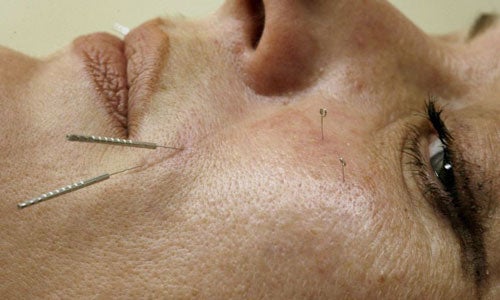Alternative medicine professions 'need statutory regulation'

Your support helps us to tell the story
From reproductive rights to climate change to Big Tech, The Independent is on the ground when the story is developing. Whether it's investigating the financials of Elon Musk's pro-Trump PAC or producing our latest documentary, 'The A Word', which shines a light on the American women fighting for reproductive rights, we know how important it is to parse out the facts from the messaging.
At such a critical moment in US history, we need reporters on the ground. Your donation allows us to keep sending journalists to speak to both sides of the story.
The Independent is trusted by Americans across the entire political spectrum. And unlike many other quality news outlets, we choose not to lock Americans out of our reporting and analysis with paywalls. We believe quality journalism should be available to everyone, paid for by those who can afford it.
Your support makes all the difference.Acupuncturists, Chinese medicine practitioners and medical herbalists should be formally regulated to ensure they are "fit to practise", the Health Professions Council (HPC) told the Government today.
The professions are not currently subject to statutory regulation but the HPC formally recommended a system was introduced to make it easier to ensure people were "meeting standards".
HPC chief executive Marc Seale said: "The HPC has made a recommendation to the Secretary of State for Health advocating the regulation of acupuncturists, medical herbalists and traditional Chinese medicine practitioners.
"The HPC was set up in order to protect the public and we strongly believe that statutory regulation can more effectively assure that practitioners are meeting standards and are fit to practise."
A Department of Health steering group report in June said regulation was "in the public interest".
It said it was important people had confidence that practitioners from these fields were "properly trained, understand the limits of their competence and know when and to whom to refer".
The report added: "There has also been widespread concern about the safety, in particular, of traditional Chinese medicines when inappropriately administered."
The HPC already regulates 13 health professions, including chiropodists and podiatrists, dieticians, paramedics, physiotherapists, radiographers and speech therapists.
Each profession has a professional title which can only be used by those who meet the requirements to join the HPC's register.
Using the title without being on the register is a criminal offence.
The steering group said the HPC had already demonstrated effective, safe and cost-effective statutory regulation and it was "convinced" this could be extended to cover practitioners of acupuncture, herbal medicine, traditional Chinese medicine and other traditional-medicine systems practised within the UK.
However it recognised the workload associated with regulating acupuncture, herbal medicine and traditional Chinese medicine might be greater than that previously experienced in regulating well-established health professional sectors.
The HPC said earlier this year it would welcome the opportunity to regulate the professions although the final decision about regulation and how it was achieved rested with the Government.
Join our commenting forum
Join thought-provoking conversations, follow other Independent readers and see their replies
Comments